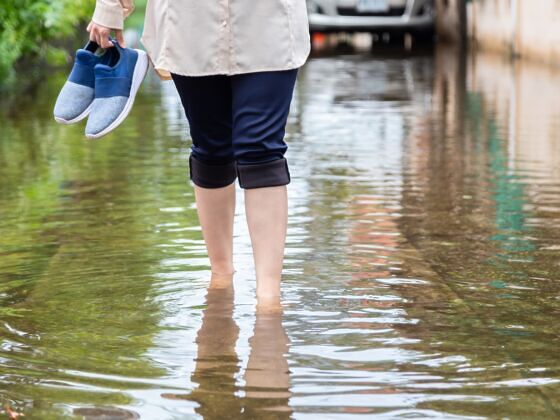I CAN’T SLEEP and I’ve given up trying. Instead I make cup after cup of tea and ransack my cupboards, hoping to find some whiskey. But there’s only an empty bottle I forgot to replenish. The sirens kick in again; Twitter is a torrid stream of unbelievable photos, evacuation warnings, announcements in all caps — “MOVE TO HIGHER GROUND IMMEDIATELY.” Hashtag Boulder.


I send a few hastily typed emails to friends and family, letting them know I’m okay. They write back wondering what in the hell is going on because what seems like the epicenter of the world to me has not yet made national news.
It started raining Monday afternoon. I got soaked riding my bike home from work. The creek rose a little on Tuesday. I put off errands I needed to do, glanced over at the creek. Seemed okay. It kept raining. Wednesday I received a terrifying text telling me to move immediately to higher ground. It was followed shortly by sirens and loudspeakers. “Flash flooding is imminent. Do not attempt to cross Boulder Creek. Move to higher ground.”
Safely ensconced on the third floor of my apartment building, I posted a few tweets requesting the Pacific Northwest to reclaim its weather. I joked about sleeping with my whitewater kayak next to my bed. When the power flickered on and off, I laughed about needing to eat all of the ice cream in the freezer before it melts.
I keep waiting for the rain to stop; the sirens to stop blaring. It just pours down harder and harder. When there is a pause at midnight, I look up from refreshing my news feed, startled by the sudden stillness. But then there is a clap of thunder and the silence is filled with rain hammering on my roof. From the window, I can see the muddy tongues of water glinting in the streetlights; Boulder Creek is swelling rapidly, spilling out over the banks, the bike path, the streets. When I step out onto my balcony, the planks of wood feel soggy and slimy against my bare feet. The power flickers, but stays on. I charge my phone, just in case.
I look around and try to think what I would save if I had to grab my things and evacuate. It’s an unlikely scenario given that I’m on the third floor, but I set aside a box of old journals, my passport, and a ring that belonged to my grandmother. By the look of my Facebook feed, not many people in the Boulder area are sleeping. Instead, we are posting videos, checking in on friends, bailing out flooded basements, putting buckets under leaking roofs, worrying about those in our community who have been forced to evacuate, wondering when the rain will stop, and staring down the vulnerability of a natural disaster.
We are becoming increasingly familiar with the sort of powerlessness that grips a person while watching a wildfire ravage a community, a flood sweep through a neighborhood, a storm batter a city, an earthquake level a town. No matter how old you are, no matter where you’re from, a natural disaster is the sort of situation that can take everything you’ve ever felt secure in and turn it upside down within a matter of seconds. With the rising water in Boulder, looking down the road toward Lyons in its isolation, it’s easy to relive previous disasters. Wading through Alton, Illinois in the Great Flood of 1993, multiple earthquakes in California, fleeing the Sierra Nevada wildfires in 2001. It’s easy to remember what it was like to be on the other side too, watching in horror at the waters rising in Louisiana and New York and New Jersey.
We have become experts in glossing over our own vulnerability, but there are moments that strip a person of any remaining bravado. A fireman clinging to a tree in a canyon, reporting walls of water ripping down the canyons; a warning of a 30ft wave of water and debris and a notice to evacuate. My vulnerability, the vulnerability of my entire community, hangs in the balance. There is nothing to be done, but wait. I refresh Twitter.
The National Guard arrives. The sheriff’s department urges us to stay off the streets. The sirens blare and Twitter explodes with announcements about new surges in water levels. It’s supposed to keep raining throughout the night. There is some hope that the rain will ease up tomorrow, giving a chance for the waters to recede.
But for now, it is still raining, the sirens are going off again, and my roof is leaking.
My neighbors and I slide open our doors and move out onto our balconies to hear the announcement, though we have already memorized the warnings. From the second and third floors, we lean over the railings and look up at the sky and then down below at the raging torrent that used to be a peaceful creek.
It’s disconcerting, this vulnerability, this powerlessness forced upon you without any warning. My next door neighbor leans over her balcony. “You doing alright? Need anything?”
“I’m alright, I think. You?”
“Yeah, we’re okay.”
We stand and listen to the sirens. The rain splashes onto my feet. I get an email from a friend. “Boulder Creek running at 5000 cfs. Alert issued. Get to higher ground IMMEDIATELY.”
I turn to head back inside, unable to distinguish between the rush of the flood, the wind, and the rain. The sirens are nonstop now; people are fleeing from my apartment complex.
I pace around my apartment for another hour, worried, watching the water levels and obsessively checking the leaks in my roof. Eventually I go to bed. It’s still raining. There is nothing else to do.